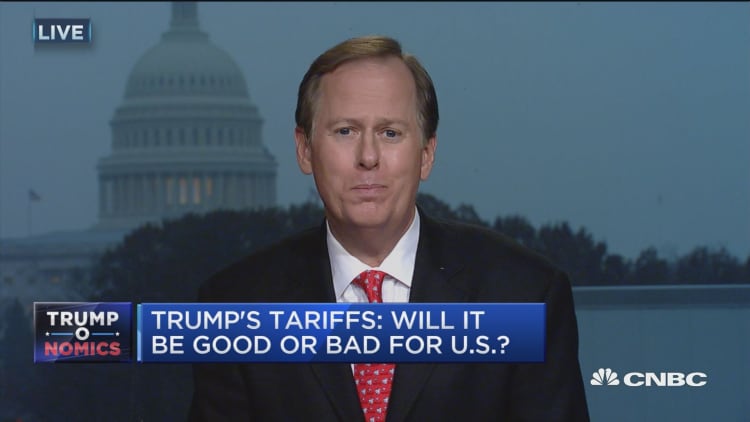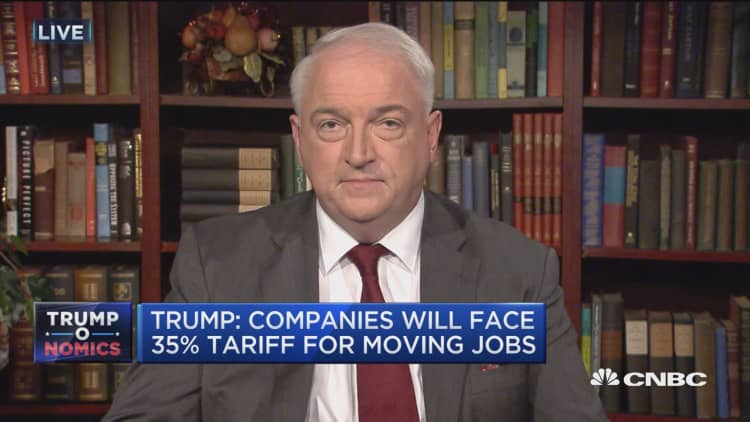
Donald Trump is still talking tough about China — even with all the presidential campaigning behind him — and some investors are starting to wonder who gets hit hardest if he puts words into action.
Perhaps most concerning to Wall Street are the ramifications of the president-elect's talk of a punitive 45 percent tariff on goods imported from China, the world's second-biggest economy. The current average tariff on imports from China is about 3 percent, according to the U.S. International Trade Commission.
Some economists say a tariff of that size could slow China's economy by 3 percentage points, that according to Capital Economics.
"The direct impact on GDP would be sizable. The value added by export[s] is about 10 percent of China GDP, and [the] U.S. accounts for about one-fifth of China exports," Gene Ma, chief economist for China at the Institute of International Finance, told CNBC.
But the pain would almost certainly spread to the U.S.-based multinationals that do business in China.

After years of diversification and globalization, big U.S. retail chains including Wal-Mart and others sell a tremendous amount of merchandise made in China to consumers in America. Low production costs in Asia and Latin America bring cheap goods to shelves in the United States, but tariffs would increase the cost of selling Chinese-made goods into the U.S. — that in fact appears to be Trump's goal.
An added tax on Chinese goods could pressure corporate margins and raise questions about how much many popular products will cost in a years' time.
Wal-Mart did not immediately respond to a CNBC request for comment.
China exported about $482 billion in goods to the United States in 2015, more than any other country exported to the U.S., according to the Office of the United States Trade Representative.
It is the technology industry that is perhaps most dependent on China, either for the manufacturing of specific components or whole products.
Research consultancy Capital Economics points out that China is the source of three-quarters of mobile phones and 93 percent of tablets or laptops shipped to the United States.
Over the past 15 years, China has been a manufacturing hub for big, diversified technology companies like Apple and Microsoft that specialize in hardware and software. Manufacturers in Harbin, China, that spoke to CNBC said the Chinese are known for their meticulous attention to detail and skill at manufacturing high-quality goods.
But an added tax on goods made in China could push multinational companies to re-evaluate whether their exposure to China makes sense, or if it is time to scale back operations. The answer would likely be complicated.
According to a Thomson Reuters model from analytics research group StarMine, companies with high revenue exposure to China include many semiconductor companies, such as Skyworks Solutions, Qualcomm, , Micron Technology and Texas Instruments. Many of those companies specialize in chips that power smartphones and tablets of Apple, Google and others.
The Semiconductor Industry Association, a trade group that represents the industry, was not immediately available for comment.
'Ultimately his policies will likely be favorable'
But not all the global trade proposals Trump has floated are bad for U.S. companies, or even technology companies.
"President-elect Trump specifically mentions on his website that he would offer a one-time tax repatriation holiday of 10 percent for cash held offshore," Gene Munster, senior research analyst at Piper Jaffray, said in a Nov. 17 research note. "This most obviously helps Apple, who held $216 (billion) in cash and marketable securities through foreign entities as of September 2016. Google would also benefit, holding $49.7 billion."
Serial entrepreneur Div Turakhia, who sold Media.net in August for $900 million, also thinks that in the long term, Trump will be good news for the tech industry.
"Some of the economics of these trade deals may change, but Trump is a businessman, so ultimately his policies will likely be favorable for the tech sector," Turakhia said.
Ma also noted that the Trump administration would most likely focus less on technology and more on the industries in the Rust Belt states, whose votes proved crucial for his election victory. Industries there include steel, tires, appliances and auto parts.
Correction: This story has been revised to correct the spelling of Div Turakhia.





